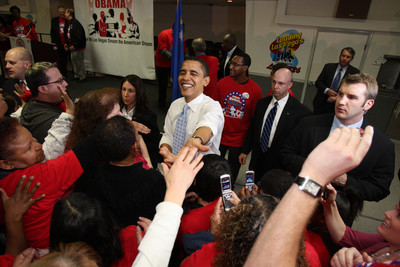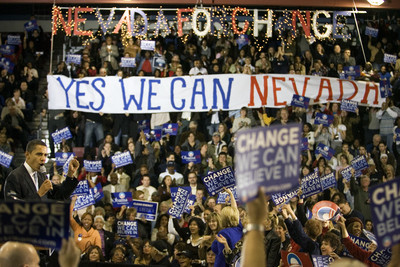Obama rocks Vegas faithful
From the back of the Culinary union hall on Friday, all that could be seen were hundreds of upraised hands -- black, brown and white -- clapping to the chant "Sí se puede."
They were clapping along with Geoconda Arguello Kline, an immigrant from Nicaragua who came to Las Vegas for a low-skilled job in a hotel. She learned English. She saved enough to buy a home for the family she was raising. She took advantage of job training programs to move up in her work, and she became active with the union.
Now Kline, "Geo" to the union's members, is president of Culinary Local 226, the 60,000-person union of hotel, restaurant and laundry workers that includes most non-gaming workers on the Strip. She symbolizes what the union calls the "Las Vegas dream."
This is a union whose members, more than 300 in the stuffy, hot, sour-smelling hall downtown, have been trained to make some serious noise on command, and that is what they did when the presidential candidate whom their leaders decided to support, Democrat Barack Obama, took the stage to accept the endorsement.
"Every time I come here I feel good, because I am not only among friends, I am also among the best of the labor movement in this country, right here in this room," the Illinois senator said.
The union members' discipline and political organization are legendary in Nevada. But the decision to go with Obama -- made late in the game Wednesday, after the contests in Iowa and New Hampshire had been decided -- poses by far their biggest challenge yet.
The endorsement has split the union from its biggest allies, including most of the big Democratic names in the state. Union leaders say they never considered themselves part of the party establishment anyway, and they relish what might be an underdog role. But there's no question that the coming days, until Nevada holds presidential caucuses a week from today, will create serious fractures.
With Obama's rival for the Democratic nomination, New York Sen. Hillary Clinton, in Las Vegas on Thursday evening and again this morning, and Obama pledging to spend almost all of the next week in the state starting Sunday, it stands to be a battle of inches in which nothing will be taken for granted.
And so Obama stood before a Culinary crowd that was already wearing red T-shirts with his name printed on them, telling them how he would "make the Las Vegas dream the American dream."
He told them how, after graduating from Harvard Law School, he "turned down a job on Wall Street" to spend "three and a half years doing what the men and women of Local 226 are doing right here today, and that is organizing and working and fighting to keep the American dream alive for all people, not just some people."
He told of living on a pittance, with "holes in my shoes and holes in my car -- you all know what I'm talking about."
That experience, he said, taught him the importance of bottom-up change, of unity in the face of power, of ignoring the odds.
Obama hit on his themes of change, hope, and driving out the "fat cats" to clean up Washington; he speaks of wholesale upheaval, but also always emphasizes working together and finding ways for opposing parties to come to agreement, as if proposing a revolution that somehow wouldn't upset anyone.
"I'm running because I don't want to do business as usual," he said. "People say 'Well, he may have good ideas, he may be inspiring, but he hasn't been in Washington long enough.' They want to season and stew me until they boil all the hope out of me, like everybody else."
Michelle Barfield, 41, a cocktail server at the Fremont, said she identified with the fact that Obama had been raised by a single mother, because she had been one herself.
"He knew what it's like to be in those shoes," she said.
She had nothing against the other candidates, she said, but said she put no stock in those who wonder whether the union can command its members' loyalty or whether it can be divided by Clinton's furious efforts or other influences.
"We agreed to stick together," she said. "Look around you. We're united. If we could unite for our contracts, we can unite for this."
On Friday morning, a few dozen Culinary members staged a protest at union headquarters purporting to have to do with the Obama endorsement. But most of them seemed to be exercised mainly by internecine union politics and only a few carried Clinton signs, possibly for the press' benefit.
The same slogan the union members were chanting in Spanish inside the Culinary hall was being chanted in English across town, at Del Sol High School on Patrick Lane: "Yes, we can."
The high school's gym was filled to capacity, which organizers said was more than 2,500. The fire code kept more than 1,000 others from entering, so Obama delayed his entrance indoors in order to give a short version of his campaign speech outside.
As he has campaigned in Nevada over the past year, which the Democratic candidates have steadily done despite Nevada barely being recognized as a primary battleground until it became the Iowa-New Hamphire tiebreaker on Tuesday, Obama has tried some other approaches: the "house party" of neighborhood supporters, the "roundtable" of canned, topical issue discussion. But on Friday he was returning to the format that got him a reputation as the rock star of the Democratic field, the crowds that seem more like fans than voters.
Obama apologized to the crowd outside for not being able to accommodate them and told them he would be in Nevada on Sunday, Monday, Tuesday and Wednesday, spending Thursday in California, but returning to the state Friday and Saturday for caucus eve and caucus day.
Inside the Del Sol gymnasium, a 30-foot-long banner stretched across an entire section of bleachers, and "Nevada for Change" was hung from the rafters in red-white-and-blue letters draped with Christmas lights. Las Vegas entertainer Clint Holmes was in the audience.
When Obama finally arrived, after the delay created by the impromptu outdoor appearance, he was introduced by Arizona Gov. Janet Napolitano, who said her state shares with Nevada the feeling that "for a long time, Washington, D.C., has just been a city where good ideas go to die."
Obama has gained confidence as his campaign has been taken more seriously. "My job," he told the crowd, "is to be so persuasive tonight that even though it's nighttime, a beam of light is going to shine down on me, and you're going to say, 'I have to vote for Barack.'"
Once again Obama gave what he calls his "hope-mongering" spiel, with a jab at a certain someone who believes she has paid her dues and he has not.
"I'm running not because I feel that something is owed to me, or because it's my turn," he said. "I'm running because of what Dr. Martin Luther King called the 'fierce urgency of now' -- because I believe there is such a thing as being too late."
Some critics, he said, accuse "hope" of being nebulous or passive, a philosophy of simply waiting for things to happen. "That's not what hope is," he said. "Hope is not blind optimism. It isn't not recognizing that there are obstacles in front of you. Hope is working and fighting hard."
Obama took questions from the audience for more than half an hour. One person wanted to know what he would do about "anchor babies," the term for children of illegal immigrants who are automatically made citizens because they are born on U.S. soil and then serve as "anchors" for their families.
He outlined his position on immigration, essentially the same as the bill that passed the Senate and died in the House last year that would beef up border security while providing avenues for existing illegal immigrants to get legal.
But, he said, "I'm not going to change the Constitution of the United States. The Constitution says if you're born here, you're a citizen."
A man who said he'd lost many relatives to cancer attributable to the fallout from nuclear testing wanted to know Obama's stance on the proposed nuclear waste repository at Yucca Mountain in Nevada. "I'm opposed to Yucca Mountain, period," he said, adding governments and industries have a responsibility to tell people about potential hazards they're being exposed to.
He pointed to his home state of Illinois, home to the most nuclear plants in the country, where plants were releasing tritium into the water without telling people, and said he had passed a measure in Congress requiring that people be informed of such releases and protected from them.
"The larger point is, we've just seen seven years of an administration that basically believes anything goes if it's for a profit," he said.
"They do not believe in regulation."
Contact reporter Molly Ball at mball@reviewjournal.com or (702) 387-2919.


















